Related Research Articles

Hans Moser was an Austrian actor who, during his long career, from the 1920s up to his death, mainly played in comedy films. He was particularly associated with the genre of the Wiener Film. Moser appeared in over 150 films.

Veit Harlan was a German film director and actor. Harlan reached the highpoint of his career as a director in the Nazi era; most notably his antisemitic film Jud Süß (1940) makes him controversial. While viewed critically for his ideologies, a number of critics consider him a capable director on the grounds of such work as his Opfergang (1944).

Heinrich Wilhelm "Heinz" Rühmann was a German film actor who appeared in over 100 films between 1926 and 1993. He is one of the most famous and popular German actors of the 20th century, and is considered a German film legend. Rühmann is best known for playing the part of a comic ordinary citizen in film comedies such as Three from the Filling Station and The Punch Bowl. During his later years, he was also a respected character actor in films such as The Captain from Köpenick and It Happened in Broad Daylight. His only English-speaking movie was Ship of Fools in 1964.

Carl Esmond was an Austrian-born American film and stage actor, born in Vienna, Austria-Hungary. Although his age was given as 33 in the passenger list when he arrived in the USA in January 1938, in his naturalization petition his birth year is stated as 1902. His stage names were Willy Eichberger and Charles Esmond and finally Carl Esmond. He trained at Vienna's State Academy of Dramatic Arts, and made his film debut in the operetta The Emperor's Waltz (1933). He was active in the Viennese genre of shallow romantic comedies so popular in the Austria of the interwar period.

Werner Johannes Krauss was a German stage and film actor. Krauss dominated the German stage of the early 20th century. However, his participation in the antisemitic propaganda film Jud Süß and his collaboration with the Nazis made him a controversial figure.
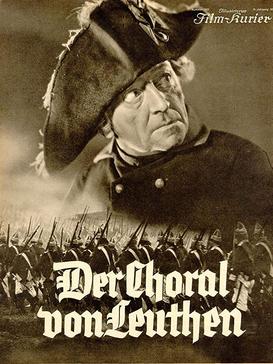
The Hymn of Leuthen is a 1933 German film depicting Frederick the Great, directed by Carl Froelich starring Otto Gebühr, Olga Chekhova and Elga Brink. It was part of the cycle of nostalgic Prussian films popular during the Weimar and Nazi eras. The title refers to the 1757 Battle of Leuthen.
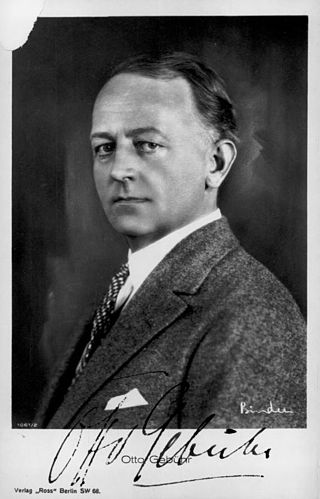
Otto Gebühr was a German theatre and film actor, who appeared in 102 films released between 1917 and 1954. He is noted for his performance as the Prussian king Frederick the Great in numerous films.

The Great King is a 1942 German drama film directed by Veit Harlan and starring Otto Gebühr. It depicts the life of Frederick the Great, who ruled Prussia from 1740 to 1786. It received the rare "Film of the Nation" distinction. It was part of a popular cycle of "Prussian films".
The Immortal Heart is a 1939 German drama film directed by Veit Harlan and starring Heinrich George. It was based on Walter Harlan's play The Nuremberg Egg and depicts the inventor of the watch, Peter Henlein.
Die goldene Stadt, is a 1942 German color film directed by Veit Harlan, starring Kristina Söderbaum, who won the Volpi Cup for Best Actress.
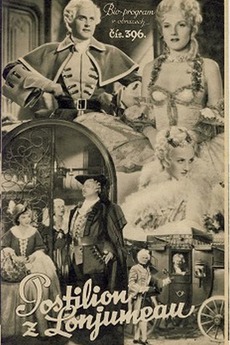
The Postman from Longjumeau is a 1936 Austrian-Swiss musical comedy film directed by Carl Lamac and starring Carl Esmond, Rose Stradner and Alfred Neugebauer. The film is known by several alternative titles including Der König lächelt – Paris lacht. It is loosely based on the 1836 opera Le postillon de Lonjumeau by Adolphe Adam. In eighteenth-century France, a Postilion from Longjumeau is summoned by Madame de Pompadour to sing in her opera company, forcing him to be separated from his wife.
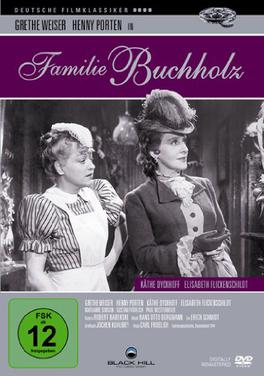
The Buchholz Family is a 1944 German drama film directed by Carl Froelich and starring Henny Porten, Paul Westermeier, and Käthe Dyckhoff. It is a family chronicle set in late nineteenth century Berlin. It is based on an 1884 novel by Julius Stinde. It was followed by a second part Marriage of Affection, released the same year. It was shot at the Tempelhof Studios in Berlin. The film's sets were designed by the art director Walter Haag.

Covered Tracks is a 1938 German historical drama film directed by Veit Harlan and starring Kristina Söderbaum, Philip Dorn, and Charlotte Schultz. It was shot at the EFA Studios in Berlin's Halensee and the Bavaria Studios in Munich with location shooting taking place in both cities as well as in Paris. The film's sets were designed by the art directors Karl Haacker and Hermann Warm. It premiered at the Venice Film Festival.
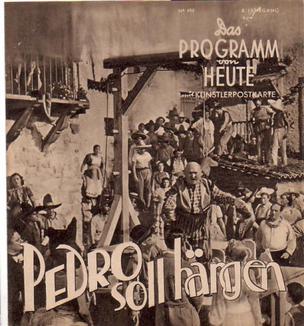
Pedro Will Hang is a 1941 German adventure film directed by Veit Harlan and starring Gustav Knuth, Heinrich George and Maria Landrock.

Frederica is a 1932 German historical musical drama film directed by Fritz Friedmann-Frederich and starring Mady Christians, Hans-Heinz Bollmann and Veit Harlan. It is based on the 1928 operetta of the same name by Franz Lehar which depicts the love affair between Friederike Brion and the young Goethe.

The Trip to Marrakesh is a 1949 West German drama film directed by Richard Eichberg and starring Luise Ullrich, Maria Holst and Karl Ludwig Diehl. It was Eichberg's last film and his first in a decade, having spend time abroad since his two part Indian-set The Tiger of Eschnapur.
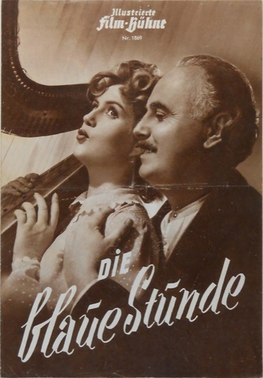
The Blue Hour is a 1953 West German comedy film directed by Veit Harlan and starring Kristina Söderbaum, Hans Nielsen and Kurt Kreuger. Production began on the film in October 1952. It was shot at the Göttingen Studios and on location on the island of Capri. The film's sets were designed by the art director Walter Haag. Because of public protests against his wartime role as a Nazi filmmaker, Harlan considered turning over the project to his colleague Geza von Bolvary but eventually decided to direct it himself.
Alarm at Midnight or Help! Armed Assault! is a 1931 German thriller film directed by Johannes Meyer and starring Hans Stüwe, Hans Brausewetter, and Otto Wallburg.

My Son the Minister is a 1937 German comedy drama film directed by Veit Harlan and starring Hans Brausewetter, Heli Finkenzeller and Françoise Rosay.
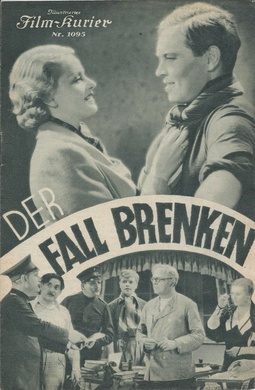
The Brenken Case is a 1934 German comedy crime film directed by Carl Lamac and starring Walter Steinbeck, Hans Brausewetter and Rudolf Klein-Rogge. The film's sets were designed by the art directors Gustav A. Knauer and Alexander Mügge.
References
- ↑ Frey, David (2017-02-28). Jews, Nazis and the Cinema of Hungary: The Tragedy of Success, 1929-1944. Bloomsbury Publishing. pp. 160–162. ISBN 978-1-78673-061-9.
- ↑ Noack, Frank (2016-03-15). Veit Harlan: The Life and Work of a Nazi Filmmaker. University Press of Kentucky. doi:10.5810/kentucky/9780813167008.003.0009. ISBN 978-0-8131-6700-8.
Bibliography
- Bergfelder, Tim & Bock, Hans-Michael. The Concise Cinegraph: Encyclopedia of German. Berghahn Books, 2009.